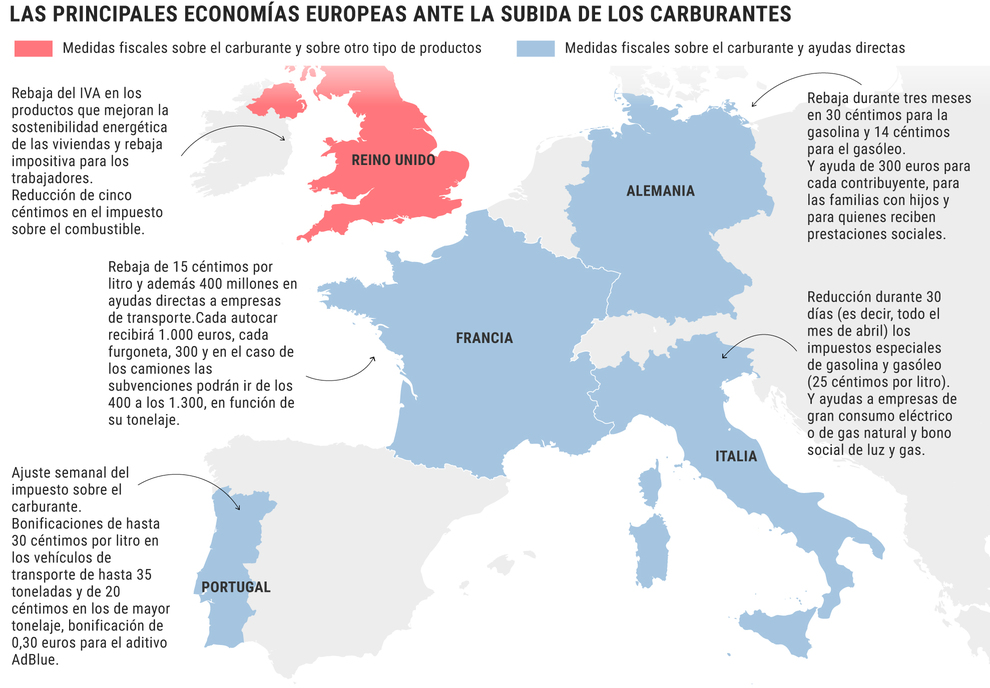WILLIAM OF THE PALACE
M. COWBOY (INFOGRAPHIC)
Updated Friday, March 25, 2022-02:07
Share on Facebook
Share on Twitter
send by email
Comment
Both Germany and the United Kingdom announced in the last few hours packages of measures to mitigate the impact of the energy crisis, especially due to the recent increase in fuel prices.
They try to remedy it -or, at least, palliate it- with direct aid and reductions in the price of fuel, which is already beginning to affect final prices.
In Spain, the crisis joins the strike called by the National Platform for the Defense of Transport, which includes it among its demands.
The coalition government led by German Chancellor Olsaf Scholz presented several tools for its citizens on Thursday.
The most notable, a single payment of 300 euros for each taxpayer, which will serve as help against increases in the price of energy and will be made through the payroll.
Of course, taxes will be applied, so the amount will be somewhat less.
The self-employed, for their part, may apply a single equivalent reduction of their advance payment of income tax.
There will also be aid for families with children and for recipients of social benefits.
As far as fuel is concerned, a reduction in fuel tax will be applied, which will be at the lowest allowed by Europe for three months.
Berlin thus hopes to reduce
the price of a liter of gasoline by 30 cents and that of diesel by 14 cents
.
Likewise, there will be an equivalent measure for those who use public transport: a monthly ticket that will cost nine euros and can be purchased during the next three months.
Before Scholz, the Boris Johnson government had announced its package.
It was done by his Economy Minister, Rishi Sunak, who was in charge of transmitting the information.
Its fuel tax reduction is much more moderate than that of other countries, only five cents, but it is because it will be in force much longer: until March of next year.
This long-term vision also applies to the reduction, for five years, of VAT on products that improve the energy sustainability of homes.
In addition, there will be a tax cut for workers (it will arrive in July) and there are social programs that will receive more funds than previously planned.
The two governments are the latest to join a trend that is spreading across Europe without Spain taking the plunge.
France, Portugal and Italy had already made a move.
Meanwhile, the Executive of Pedro Sánchez has announced some plans, but has not specified and, in any case, does not intend to approve its measures until the Council of Ministers next week, which is held on the 29th.
The reason is that the European Council in which a common position to deal with the energy crisis will have been concluded will have concluded beforehand.
Short-term measures, such as those already being applied by several countries, should come out of it, as well as, above all, long-term measures.
The EU wants to minimize
dependence on Russian gas
, which is the main cause of the skyrocketing price of electricity.
But between their first meeting, without concrete decisions, and the official one, the price of fuel has also skyrocketed, which in Spain, moreover, has coincided with the protests in the transport sector.
Meanwhile, France has already announced measures twice.
In the first place, some more general ones due to the energy crisis, which the Prime Minister, Jean Castex, advanced in an interview.
The most relevant is a reduction of 15 cents per liter on fuel that will come into force on April 1 and will last for four months.
In addition, a little later he announced a direct aid plan for transport companies, to which they will allocate
400 million euros
.
They will vary depending on the vehicle, but can range from 300 euros (vans or ambulances) to 1,300 (heavy duty trucks).
The Portuguese government has also remained active.
It was one of the first to try to tackle the crisis, with an extraordinary reduction in fuel tax that is adjusted weekly based on how much they estimate fuel prices will rise.
Later, he added a bonus of up to 30 cents per liter for transport vehicles, which remains at 0.20 euros in the case of those of more than 35 tons.
In total, assures the Executive, Portuguese citizens already saved 25 euros for every 50 liters of gasoline.
In the transport sector, they estimate that their support will be equivalent to half of the average consumption, so the savings will be between 342 and 1,260 euros in three months.
The other large European economy that has not wanted to wait for the Council to take measures -not to apply them- is Italy.
In his case, it was at the end of last week - that is, somewhat later than Portugal and France - when he announced a reduction in excise duties on gasoline and diesel, which they hope will reduce 25 cents per liter.
It will last 30 days and will come into force on April 1.
In addition, aid will be given to companies that have a high electricity or gas consumption and a social bond will be created for these two energy sources.
Conforms to The Trust Project criteria
Know more
Gasoline
HBPR
Graphics
FuelsAlbacete, Andalusia, Asturias... this is how the transport strike is affecting the supply of gas stations
Transport strike Carriers to the Government: "You are negotiating with the wrong people"
Transport conflictStrike by carriers: keys to understanding why the strike continues despite aid for diesel
See links of interest
Last News
cheap gas stations
Default Russia
When does the 2021 Income start?
Income 2021
Work calendar 2022
Economy Podcast
Anadolu Efes Istanbul - Olympia Milan
Maccabi Fox Tel Aviv - Real Madrid
Portugal - Turkey, live
Italy - Macedonia live

